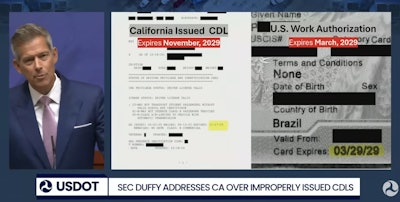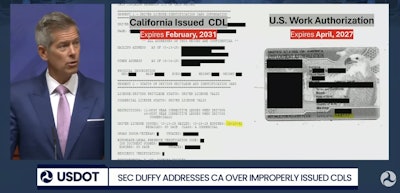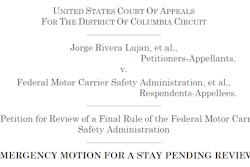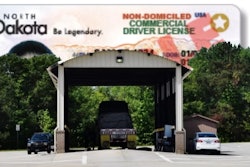California has finally admitted some missteps in issuing non-domiciled CDLs in response to DOT's September 26 letter that found "systemic policy, procedural, and programming errors in California’s issuance of non-domiciled" CDLs.
But those mistakes are minor, and only with respect to state law, California's DMV wrote in its response to DOT, dated October 26 and signed by the state DMV's director, Steve Gordon.
- California responded to DOT's accusations of systemic failures in issuing non-domiciled CDLs by denying breaking any federal rules and only making a few technical errors.
- The state found 20,000 of 65,000 non-domiciled CDLs issued with expiration dates later than the applicant's legal stay in the country, but refused to revoke them.
- The state might revoke up to 4,000 California CDLs it issued to Mexican citizens, but argues it's fine to give state CDLs to Mexican citizens.
- California's response conspicuously doesn't respond to last week's DOT report that the state upgraded a non-domiciled CDL on October 15 when it was ordered not to.
California has long defied federal direction on enforcing English language proficiency standards, which has already cost the state $40 million in federal inspections-program funding.
[Related: Six states issuing CDLs 'not consistent with federal regulations': What's going on]
Now, the state says it's complied with DOT's new emergency rule halting non-domiciled CDL issuance and tightening the requirements. Yet its October 26 reply to DOT's September letter also states that California did not break federal rules when issuing non-domiciled CDLs to Mexican nationals, or to others with terms months or years in excess of the applicant's legal authorized presence in the U.S.
California DMV's response to DOT does not address the recent "bombshell" report that the state upgraded driver Jashanpreet Singh's CDL from intrastate to interstate on October 15, just days before that driver killed three in an impaired driving crash on I-10.

Overdrive repeatedly asked California DMV and State Transportation Agency about Jashanpreet's license and has received no reply.
California DMV's 16-page response to DOT offers details about some 65,000 non-domiciled CDLs it issued and its plans to revoke some of them in accordance with DOT's new rule.
While the state does admit some problems, it ultimately argues that it complies with federal regulations and shouldn't lose an additional $120 million in federal highway funding.
California "DMV initiated an audit that has revealed certain technical limitations in its systems, and it is duly working toward correcting those issues," the letter states. "However, DMV’s audit also revealed that, despite these technical limitations, its commercial driver’s license issuance policies and practices were substantially compliant with applicable federal requirements."
California says it's OK for non-domiciled CDLs to be valid long after an applicant's legal stay in the country ends
 At a press conference in September, DOT Secretary Sean Duffy showed a California CDL that expires months after an applicant's legal work authorization in the country.DOT
At a press conference in September, DOT Secretary Sean Duffy showed a California CDL that expires months after an applicant's legal work authorization in the country.DOT
Non-domiciled CDLs lasting longer than someone's legal presence in the country represented one of DOT's major findings against California, but California said there's no law against it.
The state argued in its letter that federal regulations only require CDLs and CLPs include “the dates between which the license or learner’s permit is valid," California DMV wrote. "FMCSA’s contrary claim that DMV was required 'to ensure that the non-domiciled CLP or CDL period of validity does not exceed the expiration of the lawful presence documents' is thus unsupported."
FMCSA's new non-domiciled CDL issuance rule adds the requirement that CDLs can't outlast legal presence, which California DMV said only proves that the requirement didn't exist before September 26.
California says it's fine to issue non-domiciled CDLs to Mexican citizens
 Duffy showed an image of a CDL issued to a "citizen of Mexico who is ineligible for a non-domiciled CDL. Mexican and Canadian citizens are not eligible for a U.S. CDL. California gave him one anyway with a doubles and triples endorsement that expires" long after his work authorization ends.
Duffy showed an image of a CDL issued to a "citizen of Mexico who is ineligible for a non-domiciled CDL. Mexican and Canadian citizens are not eligible for a U.S. CDL. California gave him one anyway with a doubles and triples endorsement that expires" long after his work authorization ends.
California said that citizenship is not the deciding factor in CDL eligibility, rather state of "domicile" is.
The DMV writes that "the regulations contain no language that could be read as a categorical bar on obtaining a CDL by citizens of specific nationalities."
The DMV cites the Code of Federal Regulations as saying a "domicile" is “that State where a person has his/her true, fixed, and permanent home and principal residence and to which he/she has the intention of returning whenever he/she is absent.”
So, if a person isn't "domiciled" in Mexico because their "permanent residence" is in the U.S. and they don't intend to return to Mexico, that person can get a non-domiciled CDL in California, the DMV stated. "That the requirement turns on domicile, rather than citizenship, is consistent with the regulation requiring that State licensing entities issue licenses only to individuals domiciled in their State."
California's DMV cites FMCSA's own guidance issued May 8, 2023, stating that a Deferred Action for Childhood Arrivals (DACA) recipient could obtain a CDL despite being a citizen of Mexico, provided they don't already have a CDL from Mexico.
A DACA recipient sued DOT seeking to halt the emergency final rule changing the game for non-domiciled CDLs, saying that he has been here since he was two years old and the rule violates his civil rights.
California says it followed federal law, but broke its own law
California DMV states that it checks CDL applications against a federal database, and even consulted with the Department of Homeland Security on how to apply federal law back in 2020. California requires I-94 forms and Employee Authorization Documents for all CDL applicants -- both documents are federally issued by DHS.
California maintains that it always checks with federal authorities as part of an automated step in its CDL issuance procedures, but that it broke its own state laws with CDLs that last longer than an applicant's legal authorization to be in the U.S.
[Related: ‘No evidence’ non-domiciled CDLs bad for safety: Lawsuit to block DOT's new rule]
In stating that, California admits it issued 20,000 non-domiciled CDLs for longer than its own state laws allow.
"The DMV has closely evaluated the expiration dates in over 65,000 records," California DMV wrote. "Of these records, approximately 20,000 non-domiciled CDLs had expiration dates that exceeded their legal presence document."
Those wrongly-issued CDLs owe to a technical issue, California DMV said.
"DMV has confirmed that shortcomings of its technical systems and processes led to licenses being issued with validity dates extending beyond expiration of the applicant’s then-current legal presence in the United States, and DMV is working to address that issue to come into compliance with California law," the letter continued, emphasis in the original. "This was not, however, a violation of federal law."
The DMV audit also found 3,970 non-DACA recipients who are Mexican nationals that it granted CDLs. "DMV is in the process of reviewing these records to ensure that those CDL-holders satisfy" federal regs, and the DMV "will revoke any CDLs issued in error."
California responds to DOT's orders, but not the 'bombshell' report
DOT ordered California to do three things on September 26:
- Pause issuance of non-domiciled CDLs
- Identify all unexpired non-domiciled CDLs that fail to comply with the Federal Motor Carrier Safety Administration (FMCSA) regulations
- Revoke all noncompliant non-domiciled CDLs or reissue the ones that do comply with the new, stricter standards.
California says it's complied with those steps, and intends to comply with DOT's rule tightening non-domiciled CDL requirements when it begins issuing them again.
For now, the letter only mentions potentially revoking the 4,000 or so CDLs for Mexican nationals who aren't DACA recipients. The other 20,000 CDLs that were valid past a driver's legal length of stay in the country won't get revoked, DMV said.
DOT's new emergency rulemaking "does not render licenses issued under the regulations applicable at the time invalid, nor does it mean that DMV’s prior practices consistent with then-applicable requirements is a basis for a finding of non-compliance," the letter states.
Finally, perhaps the part DOT most straightforwardly disagrees with, would be California stating it "has also stopped issuing temporary CDLs" in compliance with DOT's September 26 order.
[Related: Florida sues California, Washington for issuing CDLs to 'illegal alien' Harjinder Singh]
DOT directly disputed that in what it called its "bombshell" report released October 24, two days before California's letter stated it complied with DOT's order to stop issuing non-domiciled CDLs.
That report states California upgraded 21-year-old driver Jashanpreet Singh's CDL from intrastate to interstate just six days before the driver killed three by failing to slow for traffic on I-10. Singh's non-domiciled CDL upgrade should not have been granted under the terms fo the new rule, DOT said.
"If California had complied with the Secretary’s emergency rule and prevented the upgrade of Singh's driving privileges, Singh would have been required to return to the DMV" and at that time Singh would have been found "ineligible to retain the non-domiciled CDL due to Singh’s status as an asylum seeker," DOT said.
Drivers, do you support DOT's move to ban non-domiciled CDLs for nearly 200,000 non-citizen drivers? If you haven't yet, weigh in via Overdrive's survey below.









